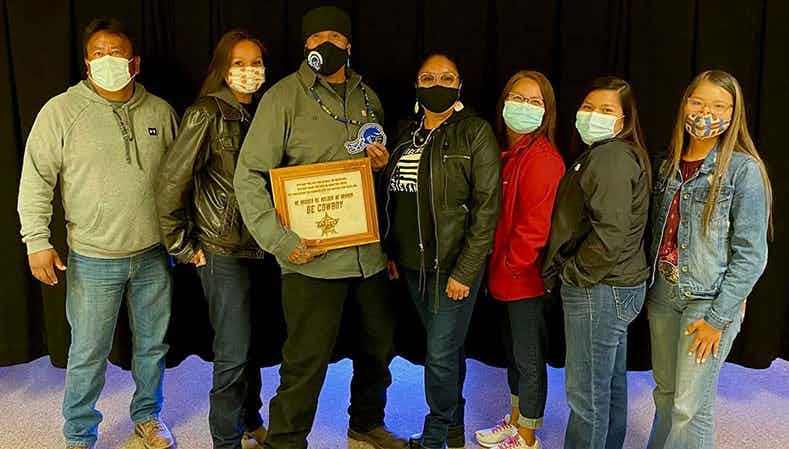
After riding Lil 2 Train for 90.25 points in the championship round, as he accepted the buckle for his first career elite series buckle win Friday night in Glendale, Keyshawn Whitehorse talked about fighting all the trials and tribulations one encounters in life.
Sitting in the socially distanced stands of Gila River Arena watching the post-event interview, Zoel Zohnnie, who grew up on an Indian reservation in north-central Arizona, could relate in his own right.
When the global health pandemic came, it hit Navajo Nation hard, generating a higher per-capita death rate than any state in the U.S.
Before the onset of COVID-19, Navajo Nation, which stretches across much of northeastern Arizona, northwestern New Mexico, and southeastern parts of Utah, where Whitehorse is from, already had a poverty rate (38%) more than twice the rest of the country. And now, during the virus, even essential businesses were being forced to close by 3 p.m.
The pandemic also affected Zohnnie, who fans may recognize from PBR’s Be Cowboy campaign.
About a year ago, he was laid off from his job as a journeyman boilermaker, specializing in power plant maintenance.
Many would see that as an opportunity to wallow in self-pity. Instead, Zohnnie asked himself, ‘What can I do to help others in need?’
While he knew several nonprofits were bringing essential supplies to Navajos, Zohnnie noticed one thing some people in remote areas weren’t getting – water.
He networked with friends, farmers markets, and community health reps who check in on the elderly to identify those without running taps who needed water the most.
Without a 9-to-5 to constrict him, he began hitching up a 275-gallon tank to make deliveries to elders in remote areas of the Navajo Nation.
At one of the first homes he visited in New Mexico near the Arizona border, an older man came out, bringing out 15 buckets. He didn’t even have a storage barrel.
“During my childhood, we didn’t have running water,” Zohnnie said. “I hauled a lot of water and knew how difficult it must be without even a storage barrel.”
He bought the man a barrel and brought it back the next day. The need for water – and his service – snowballed from there.
Zohnnie would go on to found the nonprofit Collective Medicine, and then the Water Warriors United campaign, which paid for hundreds of storage barrels for Navajo families. Collective Medicine also delivered firewood throughout the winter – processing and delivering 131 tons of wood.
Ever the PBR supporter, when Zohnnie, now sometimes called “The Water Warrior,” needed vehicles for Collective Medicine to traverse the rugged, bumpy dirt roads of Navajo Nation, he used donations to purchase Ford trucks, outfitted with Cooper Tires.
Zohnnie’s initial connection to PBR came in December 2018, when a casting director had called the boilermaker, who on occasion acted, to audition for a new commercial being created for the bull-riding organization.
The point of the campaign was to show that what defines a cowboy isn’t the boots, hat or buckle; all those who live the cowboy code and espouse values like honesty, hard work and determination are cowboys, too.
To bring that concept to life, the league turned to its sister company 160over90, also in the Endeavor network, to cast and shoot the kind of people who have dirt under their fingernails.
Zohnnie fit right into the campaign, which debuted in January 2019 on Super Bowl Sunday prior to the big game.
Considering how Zohnnie would apply his cowboy sensibilities, it was certainly spot-on casting.
But don’t back-pat Zohnnie; he wants the attention on others. He says that when Native American riders do well in the PBR Global Cup or win events like Friday night in Glendale, it has impact beyond the world standings.
“Lots of Navajos on the ranch know who guys like Keyshawn and Cody Jesus are,” he said. “Achieving that level of success turns everyone’s head. We rally around them and are very proud of them. The older people will cheer them on as if it’s their child. In the past, this kind of success was only a dream, and now it’s become attainable to a lot of our cowboys and young kids. We really look up to these guys.”
While he isn’t seeking recognition, Zohnnie and members of Collective Medicine were recognized in Gila River Arena for hard, selfless work that brought not only water and wood but precious hope to many.
“I’m more than grateful to be part of the Be Cowboy campaign and represent my people, and to be honored with our organization by PBR for helping others,” he said. “The slogan ‘Be Cowboy’ goes a long way. It symbolizes hard work and just being a good quality human being. That’s what my dad and uncle and so many others have taught me. And it’s what I hope I can teach others.”
Fans interested in supporting Zoel’s efforts can go to www.collectivemedicine.net


